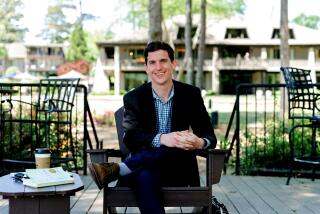‘I’m probably the most independent-dependent person in the world.’
- Share via
Lee Seitz won the battle against confinement when she got her first motorized wheelchair more than 20 years ago. She works at the Polio Survivors Foundation office to expand the lives of people who are confined and to help others who are affected by post-polio syndrome. Seitz, 61, lives in Reseda. I contracted polio in August of 1951. I was 24, and my daughter had just turned 4. The older you are when you get a disease like this, the harder it is on you. I was completely paralyzed. It’s the fever that does the damage. It’s like a soldering iron. It actually solders together the motor nerves at the base of the brain.
I was in the hospital for two years. I was in the big iron lung, and they told me that I would never get out of it. I could never have spent my life in something like that, so I graduated to a small respirator that I could have at home.
It was very hopeless. You question why it had to happen to you. I was very active before. I loved to dance, loved to skate. Of course, my husband didn’t like being tied down to a handicap. So he became a drinker, which happened in a lot of cases. We were divorced when my daughter was 7. It was difficult, a lot of adjusting. But I went through the adjusting years ago.
I was never the type to be shut in, but for 15 years that’s what I was, shut in. I didn’t really have much hope of any future until I got this motor chair. The day I got my motor wheelchair, I got in it, and I’ve never stopped. I’m not kidding, it just opens up the whole world. I’m probably the most independent- dependent person in the world. Once I’m in my chair, the whole world is mine. They just set it up so that I can operate it with my toe.
I can go within a radius of five miles, so I go to the market, I can get to a shopping center. I try to get up to the Polio Survivors Foundation office by 11 o’clock every day, and I stay there until 3.
I think it was 1984 when I first started getting letters and phone calls from all of these people, nationwide. They were all starting to go through this post-polio syndrome. The doctors didn’t know what was going on, and so they were telling each one of them that it was all in their minds, sending them to psychiatrists. The standard reply that I would get from each one of them was: “Thank God, it’s not all in my mind. I thought I was going crazy.”
They are people who contracted polio when they were children and now they’re in their middle 30s to late 40s, and they’re starting to go through these terrible dramatic changes. They’re losing use of their limbs. Some of them are having to go into breathing equipment.
When they were young, they felt like they’d really beat the rap. Now they find that this is happening, it is worse, because there’s no way they can turn it around. It’s scary.
I’ve had men call me, crying, not knowing what he’s going to do. That’s a hard thing, hearing a man cry. He’s head of a family, and now he’s got no hopes at all. That’s why we started the support groups.
There are so many people out there who still don’t know that they’re going through this syndrome. They’re being treated for bursitis, arthritis, every kind of “itis” you can think of. It’s sad because they’re the people we need to reach. If they change their life style, maybe they can live a lot longer and it won’t get become severe. Right now there are over 100,000 polio survivors in the United States.
I think our group has done a good job with the little we’ve been able to raise. We’re achieving a lot for what we can. We raised $29,000 last year, and we spent $25,000 on polio, which is a pretty good showing. We feel good about that.
I guess I feel good every day of my life. I feel good that I’m able to help. It makes me feel wonderful when I see that I’ve had a part in helping somebody change their way of life.
I love to see people who’ve been stuck in the house for years get a motor chair. I know how wonderful it makes them feel. It’s very gratifying.


